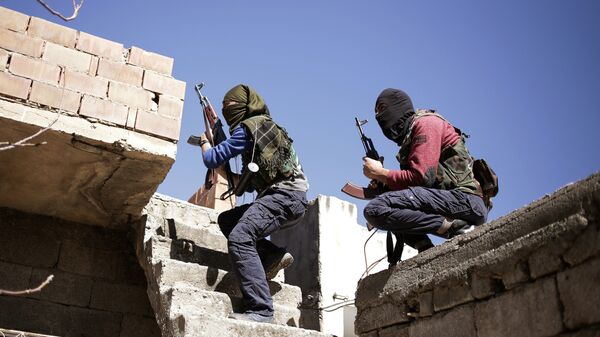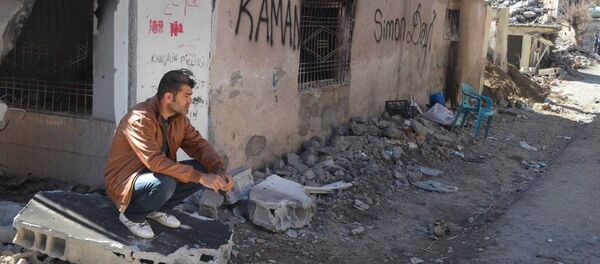"In Cizre over the last week they killed 137 people," Yuksel said.
One of the victims was Rohat Aktas, a young journalist who worked for the oldest Kurdish newspaper, he said.
According to Yuksel, Sur, a downtown district of Diyarbakir, the largest city of the Kurdish-populated southeast of Turkey, is now facing same atrocities.
"These were all Kurdish people, all civilians. They were all burned alive… Right now we are facing the same situation in Sur. Over 200 civilians were killed there. The situation is getting tougher day by day," Yuksel said.
Diyarbakir is considered to be an unofficial capital of the Turkish Kurds. In recent months it has seen a number of attacks by Ankara as part of the security forces' operation against Kurdish fighters allegedly linked to the Kurdistan Workers' Party (PKK). Security forces are enforcing a curfew in the city and, according to Yuksel, set buildings on fire.
Various radical groups, including the Daesh, as well a lot of fighters hired by Turkey to fight Kurds have an easy access to refugee camps at the border with Syria, a representative of the Kurdish Peoples' Democratic Party to the United States said.
"Radical groups, Daesh [outlawed in Russia] easily have access to these camps. A lot of the fighters against the Kurds have refugee camps' IDs," Mehmet Yuksel said.
Turkey’s Kurdish Peoples’ Democratic Party is an alliance of several pro-Kurdish movements, founded in 2012, which places strong emphasis on minority rights.
Turkish security forces are conducting “ethnic clearances,” forcing Kurds to flee the country, Mehmet Yuksel added.
"The Turkish security forces are violent against the Kurdish population. They are trying to move the population out of their territories, because they are destroying the buildings so that people cannot go back. This is some kind of an ethnic clearance against the Kurds," Yuksel said.
He added that the issue should be raised at the United Nations.
"But unfortunately we don’t have any country that is bringing it to the international agenda, saying that look, there is an ethnic clearance in Turkey," Yuksel said.
He added that Russia might be the only country that can raise the Kurdish issue in the United Nations, reminding that Ankara downed the Russian plane over an alleged violation of Turkish airspace in November.
"The situation in Diyarbakir is tightly connected to the Syrian issue. In Syria Kurds gained more territories and rights, and Turkey is afraid that in Turkey they will ask for the same…. We are asking for decentralization in Turkey and some kind of local autonomy for the Kurds. Turkey does not want to accept that," Yuksel said.
The central Sur district of Diyarbakir, which houses historic monuments dating back to 400 BC, has been the site of confrontations between the Kurdish activists and Ankara forces.
According to the Turkish General Staff, over 1,000 Kurdish militants have been killed since mid-December. Kurdish activists, in their turn, argue that most of the dead were civilian victims.
According to Yuksel, the most recent attacks carried out by Ankara against the Kurds took place in Diyarbakir and Cizre, where at least 137 people have been killed over the past week.
Turkey’s Kurdish Peoples’ Democratic Party is an alliance of several pro-Kurdish movements, founded in 2012, which places strong emphasis on minority rights.



